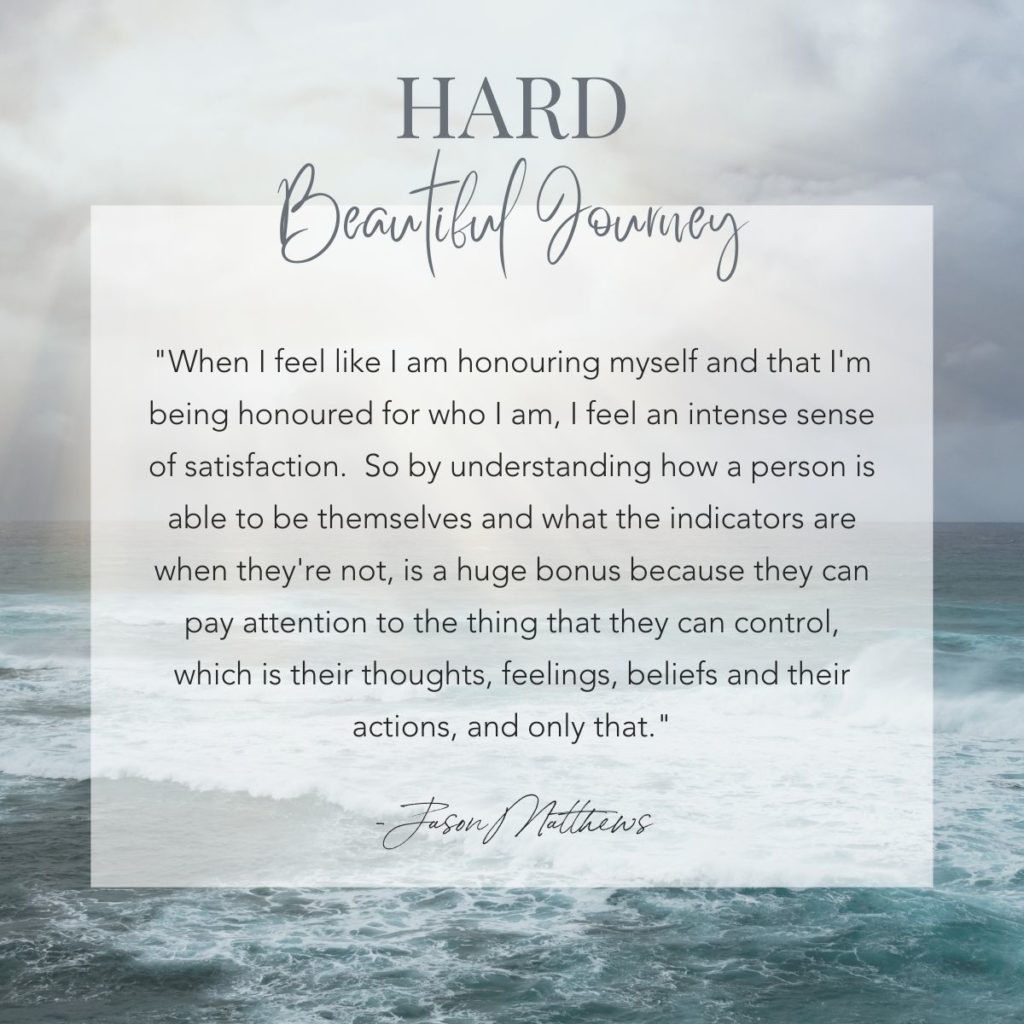My guest today blew my mind at many points in this interview, and I look forward to you hearing these moments.
Jason Matthews is here to talk about two topics: The first part of our discussion is around men and women and how we interact with each other and our peers. Jason and I discuss a few areas, such as distrust and competition of needs.
The second part of our discussion is around Human Design and what it means, and then we discuss some of the results of my Human Design reading I had with Jason earlier this year. It is fascinating what he told me. So many moments helped me understand exactly why certain things have been more difficult for me, and I know you will relate to this topic for sure!
Here are three reasons why you should listen to the complete Episode:
- Learn about the differences in how men and women interact.
- Jason provides valuable insights on the three steps of effective communication.
- Discover the four behavioral types in Human Design.
Episode Highlights
Who is Jason Matthews
- Jason has spent the last 20 years studying human behavior, human interaction, emotional trauma, and the different ways that men and women interact with themselves, with each other, and their peers.
- As an emotion investigator, Jason’s job is to teach his clients how to solve the mystery of interpersonal interaction by understanding two elements of communication: understanding and alignment.
- He offers guidance on how unlocking your compassionate power can help you create the life you imagined for yourself and get you the opportunities you want most.
Compassionate power
- Jason has found that there is a severe lack of the ability for men and women to express themselves adequately in today’s society.
- It’s because of one thing that they’re not allowing themselves to do, which is to feel compassion.
- Compassion is the desire to be seen as friendly, approachable and trustworthy, and both men and women want to do this.
Masculine and feminine energy
- Masculine energy embodies competence, the ability to be seen as capable, reliable, powerful, and action-oriented.
- Feminine energy embodies compassion, the ability to be seen as friendly, approachable, trustworthy, and development-oriented.
- Masculine and feminine energies don’t have a gender; men can express feminine energy, and women can express masculine energy.
Toxic masculinity in men
- Men have been conditioned to be seen as powerful, capable and reliable.
- They’re self-conscious about how masculine they need to appear, and this alienates them from others, often coming across as narcissistic and egotistical.
- While men naturally embody competence, it’s also essential to understand how they can be compassionate, especially in the way they connect with others.
Toxic competence in women
- Women are naturally predisposed to being compassionate, to love, develop and nurture.
- When you take away the belief that compassion is good, you strip away what makes a woman.
- What’s left is the drive to show they’re competent, capable, reliable and powerful.
- Women, however, can show competence by showing they can develop others and be a source of comfort.
Manifesting the best version of yourself
- Each gender needs to be permitted to act in a way where they can express themselves fully and play to their strengths.
- For men, their sole purpose is to act, and the action of acting makes it possible for them to create a space for women or that feminine energy to express themselves fully.
Competition of needs
- Each party focuses on its own needs, and compassion is lost.
- When focusing on a job that needs to be done, you’re left competing with one another.
- Instead, focus on what each has to offer to accomplish a goal by working together.

Focusing on your orientation
- Men are action-orientated and women are action-minded; women are development-orientated and men are development-minded.
- What you’re orientated towards, you’re naturally going to excel.
- It’s best to recognize your talents and act in that way, providing the same results and level of service as your counterpart.
Competition of needs destroys relationships
- Relationships can be destroyed when each party believes that they’re entitled to meet their own needs.
- Focusing on what you want and not listening creates immense frustration.
- Women want to be heard, while men want to be recognized for their accomplishments.
- It’s important to focus on what’s important versus what you want to be appreciated or recognized for.
Igniting reciprocity
- This goes back to action-oriented versus development-oriented.
- A development-oriented person will have a strong desire to listen first, and just the act of listening can satisfy their need.
- By their need being met, they’re inclined to find out what the other person needs, igniting reciprocity versus competing.
- If both want to be heard first, there will be a bad interaction.
Our needs are emotional
- Our needs are purely emotional, and it has nothing to do with the information. It has to do with the feeling, and it’s our feelings that need to be heard.
- If someone is sharing and doesn’t reciprocate, it’s a clue that what’s being shared is not what needs to be heard.
- This could be because they don’t feel safe to share what they need to.
Three steps of effective communication
- Ask what or how questions, label through your interpretation and get “that’s right.”
- This is not a male or female thing; it’s a human thing.
- It lets the other person know that they are heard, supported, and belong.
Coaching men
- Jason has found that most people have suffered loss or trauma and have lost their voice.
- They’re either trying desperately to prove themselves or have shut down.
- He guides them to be the best version of themselves to become powerful leaders.
- Showing them that it’s okay to show compassion and be vulnerable, whether you’re a man or woman.
Human Design
- Human Design is the combination of many different principles and schools of thought.
- It’s a framework that helps us understand how we act, interact, and react.
- There are four different behavior types: manifestor, generator, projector and reflector.
Generator
- Generators are the life force of the earth.
- Without generators, sustained action would not be possible.
- Generators can sustain energy and can get things done.
Manifestor
- Manifestors create things; they start a process and get the ball rolling.
- Once they get the ball rolling, they need to be willing to let it go as they cannot sustain energy to follow through to completion.
Projector
- Projectors are guides that can provide direction.
- They can’t sustain energy; they’re known as the nonenergy type.
- They’re the kind of people who see what’s possible and can connect the dots.
Reflector
- Reflectors make up at most 1% of the population, and they’re the least common.
- Reflectors observe what’s going on and take a 20-day cycle to really understand and reflect.
My behavioral type
- I’m a manifestor, I create things and get them started.
- Although I want to follow through, I’ve made myself physically ill trying to do all the work.
- Jason advises that the perfect marriage of behavior types are manifestors with generators.
- A generator on my team will help take my idea and what I’ve created and follow through to completion.
My behavioral lines
- Each person has two behavioral lines corresponding to a particular trait.
- My lines are two and four.
- My first line is the hermit.
- My second line is the opportunist.
My behavioral lines
The hermit
- This is someone who, by nature, needs to be alone to process emotions and information to make sense of their reality.
- When there’s value to be shared, they’re willing to share it but only for a limited time before needing to decompress.
- Often referred to as introverts.
The opportunist
- The people and environment that they’re surrounded by provides opportunities.
- They’re keen to see those opportunities and capitalize on them.
The collision of my behavioral lines:
The hermit and opportunist can be seen as a contradiction.
- The hermit side wants to be isolated, yet the opportunistic side wants to capitalize on opportunities.
- Having a generator on my team will be helpful as my manifestor energy is limited.
Insights gained from my Human Design
- As a manifestor, I’m a creator who starts things, but I have limited energy to follow through.
- A generator on my team, like a VA, will be invaluable in assisting with follow through and completing my creations.
- I’m grateful to have learned about human design, knowing that I need to stop at specific points to be a happier person.
What Jason is grateful for
- Jason is grateful for his connections and the ability to connect with other people on a more intimate level.
3 Powerful Quotes from this Episode
18:38 – “So if, if I realized that you have a need, and I can help in some way, satisfy that need, and I’m aware that that dynamic exists, it’s my job, it becomes my responsibility. So what is it that you need, and then to listen to you, regardless of whether I can fulfill that need or not? The act of listening to you is going to make you feel appreciated? Absolutely. It’s going to make you feel like you are important, that you have a voice. And because of that, you are going to naturally want to listen to what my needs are. Just the fact that I listened to you first. And this applies to romantic relationships, business relationships, friendships, even people who are in a mastermind who are working towards a common goal”.
27:12 – “Because by them being the best version of themselves, they become a very powerful leader that other people want to follow, that other people want to know more about, that become the most interesting person in a room without even needing a beer commercial. And they are able to create the kind of dynamic with their peers, with women, whether it be in a relationship, whether it be in a business, whether it be in a social setting, they create the kind of dynamic where other people find them so interesting, because they have shown that they are interested in others, because they are comfortable with the built their ability to be compassionate, while still acting deliberately”.
48:09 – “So this is something that I actually use, when I am helping a person, really understand who they are, whether it be a man or a woman, regardless of the circumstances when I am talking to them, helping them create the kind of relationships that are going to help them get to their goals, find out what it is that they need, I use human design, because it helps a person understand where they are their strongest, and what they need, to who they need to connect with in order to show up the things they’re more deficient in. It also helps in understanding what creates tension and what actually helps to release tension”.
Connect with Jason Matthews
Enjoying the Hard Beautiful Journey podcast?
Click here to follow on Apple Podcasts. While there, please leave a 5-star rating and review. It would mean so much to me! Also, if you haven’t done so already, join the Hard Beautiful Journey community to connect with other like-minded people.
I would love to connect with you on socials, so please give me a follow on:
Thanks for listening,
Tiff
Leave a Reply Cancel reply
This site uses Akismet to reduce spam. Learn how your comment data is processed.

add a comment
+ show comments